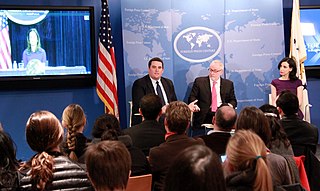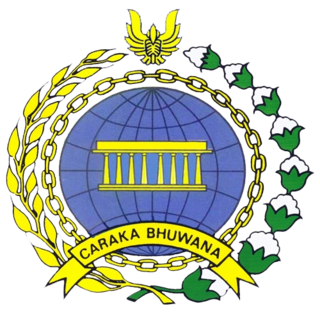Related Research Articles

The Ministry of Foreign Affairs is responsible for managing the foreign relations of Brazil. Brazil is a significant political and economic power in Latin America and a key player on the world stage. Brazil's foreign policy reflects its role as a regional power and a potential world power and is designed to help protect the country's national interests, national security, ideological goals, and economic prosperity.

The foreign relations of Ghana are controlled by the Ministry of Foreign Affairs of Ghana. Ghana is active in the United Nations and many of its specialised agencies, the World Trade Organization, the Non-Aligned Movement, the Organisation of African Unity (OAU), the African Union (AU) and the Economic Community of West African States. Generally, it follows the consensus of the Non-aligned Movement and the OAU on economic and political issues not directly affecting its own interests. Ghana has been extremely active in international peacekeeping activities under UN auspices in Lebanon, Afghanistan, Rwanda, and the Balkans, in addition to an eight-year sub-regional initiative with its ECOWAS partners to develop and then enforce a cease-fire in Liberia. Ghana is also a member of the International Criminal Court.

Kyrgyzstan favors close relations with other members of the Commonwealth of Independent States, particularly Kazakhstan and Russia.

The Islamic Republic of Pakistan maintains a large diplomatic network across the world. Pakistan is the second largest Muslim-majority country in terms of population and is the only Muslim majority nation to have possession of nuclear weapons.

The United States Department of State (DOS), or State Department, is an executive department of the U.S. federal government responsible for the nation's foreign policy and international relations. Equivalent to the ministry of foreign affairs of other nations, its primary duties are advising the U.S. president, administering diplomatic missions, negotiating international treaties and agreements, and representing the U.S. at the United Nations. The department is headquartered in the Harry S Truman Building, a few blocks away from the White House, in the Foggy Bottom neighborhood of Washington, D.C.; "Foggy Bottom" is thus sometimes used as a metonym.

A diplomat is a person appointed by a state or an intergovernmental institution such as the United Nations or the European Union to conduct diplomacy with one or more other States or international organizations.
In international relations, public diplomacy or people's diplomacy, broadly speaking, is any of the various government-sponsored efforts aimed at communicating directly with foreign publics to establish a dialogue designed to inform and influence with the aim that this foreign public supports or tolerates a government's strategic objectives. As the international order has changed over the 20th century, so has the practice of public diplomacy. Its practitioners use a variety of instruments and methods ranging from personal contact and media interviews to the Internet and educational exchanges.

The Ministry of Foreign Affairs is a cabinet-level ministry of the Japanese government responsible for the country's foreign relations.
The primary responsibility for the Japanese foreign policy, as determined by the 1947 constitution, is exercised by the cabinet and subject to the overall supervision of the National Diet. The prime minister is required to make periodic reports on foreign relations to the Diet, whose upper and lower houses each have a foreign affairs committee. Each committee reports on its deliberations to plenary sessions of the chamber to which it belongs. Special committees are formed occasionally to consider special. Diet members have the right to raise pertinent policy questions—officially termed interpellations—to the minister of foreign affairs and the prime minister. Treaties with foreign countries require ratification by the Diet. As head of state, the emperor performs the ceremonial function of receiving foreign envoys and attesting to foreign treaties ratified by the Diet.

The Department of Foreign Affairs is the executive department of the Philippine government tasked to contribute to the enhancement of national security and the protection of the territorial integrity and national sovereignty, to participate in the national endeavor of sustaining development and enhancing the Philippines' competitive edge, to protect the rights and promote the welfare of Filipinos overseas and to mobilize them as partners in national development, to project a positive image of the Philippines, and to increase international understanding of Philippine culture for mutually-beneficial relations with other countries.

Digital diplomacy, also referred to as Digiplomacy and eDiplomacy, has been defined as the use of the Internet and new information communication technologies to help achieve diplomatic objectives. However, other definitions have also been proposed. The definition focuses on the interplay between internet and diplomacy, ranging from Internet driven-changes in the environment in which diplomacy is conducted to the emergence of new topics on diplomatic agendas such as cybersecurity, privacy and more, along with the use of internet tools to practice diplomacy.

The Ministry of Foreign Affairs of Georgia is a governmental body of Georgia responsible for protecting and promoting Georgia’s interest and its persons and entities abroad. The Ministry is led by the Minister of Foreign Affairs who is nominated by the Prime Minister of Georgia as a member of cabinet, followed by the approval of the Government by the Parliament of Georgia. The position is currently held by David Zalkaliani, in office since 21 June 2018.
Paradiplomacy is international relations conducted by subnational or regional governments on their own, with a view to promoting their own interests. With globalisation, non-state regions play an increasingly influential international role. Regions, federal states, provinces and cities seek their way to promote trade, investments, cooperation and partnership in a long list of subjects and account for a significant part of today's cross-borders contacts. This trend raises new interesting questions concerning public international law and opens a debate on the future of the state system that has provided the grounds for the international political order in the last centuries.

The Ministry of Foreign Affairs of the Republic of Serbia is the ministry in the government of Serbia which is in the charge of maintaining the consular affairs and foreign relations of Serbia. The current minister is Nikola Selaković, in office since October 28, 2020.

The Ministry of Foreign Affairs, abbreviated KLN, is a ministry of the Government of Malaysia that is responsible for foreign affairs, Malaysian diaspora, foreigners in Malaysia, diplomacy, foreign relations, counter terrorism, bilateral affairs, multilateral affairs, ASEAN, international protocol, consular services, maritime affairs, chemical weapons. The current ministry is based in Putrajaya. The Ministry of Foreign Affairs Malaysia is also widely known as Wisma Putra, which is also the name of its building in Putrajaya.

The Ministry of Foreign Affairs of the Arab Republic of Egypt is the Egyptian government ministry which oversees the foreign relations of Egypt. On 17 July 2014 Sameh Shoukry was appointed Minister of Foreign Affairs.

The Ministry of Foreign Affairs of the Republic of Indonesia (MoFA), commonly referred to as the Foreign Affairs Ministry, is a government ministry responsible for the country's foreign politics and diplomacy. The ministry was formerly known as the Department of Foreign Affairs. The name changed due to the new law about State Ministry of 2008.

Diplomacy is the practice of influencing the decisions and conduct of foreign governments or organizations through dialogue, negotiation, and other nonviolent means. Diplomacy usually refers to international relations carried out through the intercession of professional diplomats with regard to a variety of issues and topics.

The Ministry of External Relations (MER) of the Union of Soviet Socialist Republics (USSR), formed on was founded on 6 July 1923. It had three names during its existence: People's Commissariat for Foreign Affairs (1923–1946), Ministry of Foreign Affairs (1946–1991) and Ministry of External Relations (1991). It was one of the most important government offices in the Soviet Union.The Ministry was led by the Minister of Foreign Affairs prior to 1991, and a Minister of External Relations in 1991. Every leader of the Ministry was nominated by the Chairman of the Council of Ministers and confirmed by the Presidium of the Supreme Soviet, and was a member of the Council of Ministers.

The Federal Secretary is the highest-ranking position in the Government of Pakistan, occupied by the most senior civil servant in a specific Ministry or Division. The Secretary is the administrative head of that Ministry or Division and oversees and enforces public policy matters. The authority for the creation of this post solely rests with the Cabinet of Pakistan. The position holder is a BPS-22 grade officer, usually belonging to the Pakistan Administrative Service.
References
- 1 2 "Pakistan's cultural and public diplomacy". 13 May 2016.
- 1 2 3 Kiani, Khaleeq (10 January 2020). "PM orders overhauling of public diplomacy, information policy". DAWN.COM.
- ↑ "Cultural diplomacy". www.thenews.com.pk.
- ↑ "Why Do Coups Happen in Pakistan: A Rejoinder". thediplomat.com.
- ↑ "Public Diplomacy – Ministry of Foreign Affairs". mofa.gov.pk.
- ↑ Sultana, Maria (8 May 2018). "How to enhance Pakistan's Public Diplomacy practices".